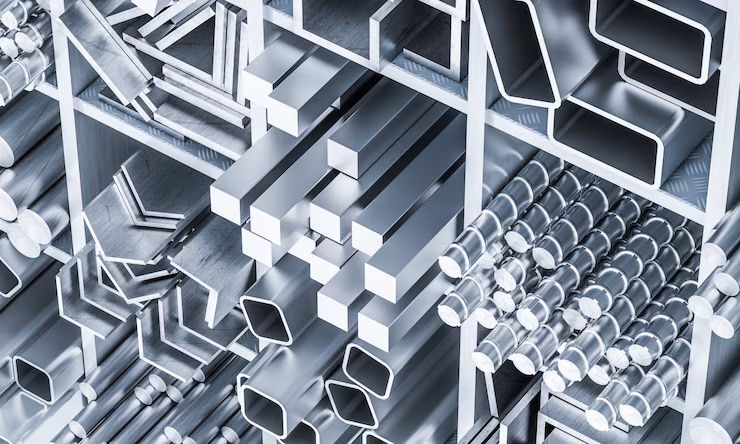Steel products refer to the wide range of goods made from steel, including raw materials like bars, sheets, coils, and pipes, as well as finished items such as beams, wires, and structural frames. These products form the backbone of construction, automotive, manufacturing, infrastructure, and household applications.
Steel, an alloy primarily made of iron and carbon, is favored for its strength, durability, and versatility. It exists in various forms, including stainless steel, carbon steel, and alloy steel, each suited to specific industrial or commercial needs.

Importance – Why steel products matter today
Steel products play a fundamental role in the modern economy:
-
Construction and Infrastructure: Used in buildings, bridges, roads, and railways.
-
Automotive Sector: Forms the body, frame, and engine components in vehicles.
-
Manufacturing: Powers the production of appliances, tools, and machinery.
-
Energy Sector: Supports oil rigs, pipelines, wind turbines, and solar mounts.
-
Consumer Goods: Appears in kitchen utensils, electronics, and furniture.
Steel's reliability and affordability make it a preferred material across nearly every industrial sector. With ongoing focus on sustainability and durability, steel products are being engineered to be lighter, stronger, and more recyclable than ever before.
Recent Updates – Trends and developments in steel products (2024–2025)
Several new developments have shaped the steel product industry in the last year:
-
Green Steel Initiatives (2024): Manufacturers are now adopting hydrogen-based steel production to cut carbon emissions.
-
Smart Steel Products: New steel alloys are being developed to self-heal or resist corrosion longer, especially in marine and coastal applications.
-
Global Demand Shift: Countries like India, Brazil, and Southeast Asian nations are increasing steel production to meet infrastructure demands.
-
Modular Steel Construction: Prefabricated steel components are being used for faster and safer building assembly.
-
AI and Automation: Steel plants are incorporating automation and predictive analytics to reduce waste and increase production efficiency.
These innovations reflect the global push toward cleaner manufacturing and more resilient building materials.
Laws or Policies – Steel industry regulations and compliance
Regulatory oversight ensures steel products are safe, environmentally sound, and fairly traded. Key policy frameworks include:
-
Bureau of Indian Standards (BIS): Sets quality standards for steel products sold in India.
-
European Union CE Marking: Ensures steel used in EU projects meets construction product regulations.
-
Import/Export Duties: Countries may impose anti-dumping duties or tariffs to protect domestic steel industries (e.g., US Section 232 Tariffs).
-
Carbon Reporting Regulations: Steel manufacturers in regions like the EU and UK are now required to report CO₂ emissions under sustainability laws.
-
Buy America Act (US): Federal infrastructure projects must use American-made steel, supporting domestic production.
These rules aim to ensure the steel industry's competitiveness, safety, and sustainability worldwide.
Tools and Resources – Useful platforms and tools for steel buyers and professionals
Whether you're in construction, procurement, or research, several resources help evaluate and source steel products:
Tools and Calculators
-
Steel Weight Calculator: Estimates material weight based on size and type.
-
Yield Strength Conversion Tools: Converts mechanical properties between units.
-
Steel Grade Comparison Charts: Compare global steel standards (ASTM, EN, JIS, IS).
Websites and Databases
-
World Steel Association (worldsteel.org): Offers data, publications, and trends.
-
SteelOrbis and MetalMiner: Price tracking and industry news platforms.
-
Bureau of Indian Standards (bis.gov.in): Quality and regulatory guidelines.
Educational Platforms
-
Coursera/Udemy: Online courses on metallurgy and materials engineering.
-
MIT OpenCourseWare: Free courses on mechanical engineering and materials.
FAQs – Common questions about steel products
Q1. What are the main types of steel products?
Steel products include flat products (sheets, plates, coils), long products (bars, rods, beams), and tubular products (pipes, tubes). Each serves different industry needs.
Q2. How is stainless steel different from carbon steel?
Stainless steel contains chromium for corrosion resistance, while carbon steel is stronger but more prone to rust unless coated or painted.
Q3. Are steel products recyclable?
Yes, steel is one of the most recyclable materials globally. It can be reused repeatedly without loss of quality.
Q4. What factors influence steel product pricing?
Steel prices depend on raw material costs (iron ore, coal), energy prices, global demand, transportation, and trade regulations.
Q5. How can I verify the quality of steel products?
Always check for certifications like ISI (India), ASTM (US), or CE (Europe), and ask for test reports (mill test certificates) from manufacturers.
Final thoughts
Steel products are essential to the global economy, offering strength, durability, and adaptability across industries. As production methods evolve, new alloys and sustainable practices are shaping the future of steel.
By understanding types, applications, regulatory concerns, and industry tools, businesses and individuals can make more informed decisions when working with or sourcing steel products. Whether in construction, manufacturing, or energy, steel remains a vital component of modern development.
